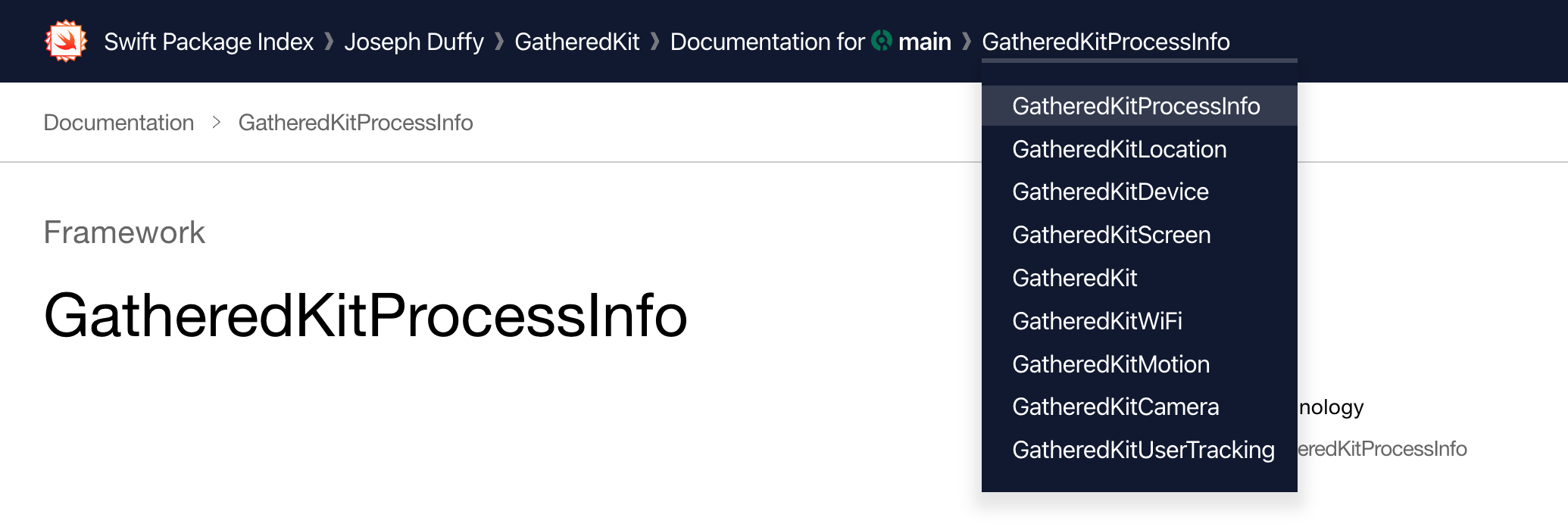UPDATE: The information in this blog post is superceded by our official documentation. Please refer to the documentation rather than this blog post.
We rolled out auto-generating, auto-hosting, and auto-updating DocC documentation exactly two months ago, and here we are again with more documentation-focused news!
Opting into this feature was simple for package authors with a quick amendment to the package’s .spi.yml file telling us what targets/platforms to use for the documentation generation process. We handled everything else from there, and a “Documentation” link automatically appears for every opted-in package.
We’re delighted to say that this feature has been a great success, and we now have over a hundred packages that have chosen to host documentation with us. That’s amazing!
We have some good news for those 103 package authors today. You made the right choice because you now automatically get versioned documentation, too!
We initially generated documentation for the default branch of a package. It was the easiest way for us to build the feature and a good first step, but versioned documentation is what we were aiming for.
When you use a package, you’d typically use the latest tagged release, so we should show documentation generated from that release by default. As of today, that’s what happens:

We continue to generate documentation for the default branch, and we’ll keep archived documentation available for every major version as packages evolve. Hover over the release to switch to the documentation for a different release or for the default branch:

We also moved the selector for packages that generate multiple documentation archives for one package:

Why not check out the feature with one of the documented packages? In alphabetical order, you can pick from AdvancedList, AgoraUIKit_iOS, AnimationPlanner, AnyAsyncSequence, AnyLint, AnyMeasure, apnswift, AppFoundation, AppStorage, Boutique, Buildkite, bytes, CalendarKit, CameraControlARView, CertificateSigningRequest, CombineCoreBluetooth, composable-effect-identifier, Compute, ConcurrencyPlus, CryptoSwift, CurrencyConverter, CustomRepeatDate, DesignReviewer, Dflat, EffectsLibrary, Epoxy, FileSystemEventPublisher, FocusEntity, GatheredKit, GeoJSONKit, gis-tools, HandySwift, HandyUIKit, KeyboardShortcuts, KeyboardToolbar, Kingfisher, LeftPad, Lindenmayer, LocationFormatter, Lottie, Media, MeshGenerator, Microya, MonthYearWheelPicker, mqtt-nio, MuJoCo, mvt-tools, NetworkReachability, OperationPlus, ParseSwift, PianoRoll, Pioneer, postgres-nio, Pretty, PrettyLog, reactiveswift-composable-architecture, RevenueCat, Runestone, Saga, ScaledFont, SceneKitDebugTools, Script.swift, secp256k1, SemanticVersion, SemanticVersioningKit, Server, SGPKit, SmoothGradient, SpanGrid, Squirrel3, Steam, StoreFlowable, StreamChat, StreamChatSwiftUI, StreamChatVapor, Stytch, swift-bundler, swift-case-paths, swift-composable-architecture, swift-confidential, swift-markdown, swift-multipart-formdata, swift-parsing, swift-url-routing, swift-xml-parser, SwiftDocC, SwiftInspector, SwiftPlantUML, SwiftProtobuf, swiftui-cached-async-image, SwiftUICharts, SwiftUnits, SwiftVizScale, SwiftyProvisioningProfile, TGCardViewController, UnsplashFramework, Updeto, URLCompatibilityKit, vapor-routing, WeakReference, XCSnippets, Yams, or YMatterType! Phew! 😅
We hope everyone loves this feature, and if you want to generate docs for your package, instructions are in the launch blog post.
 Swift Package Index
Swift Package Index